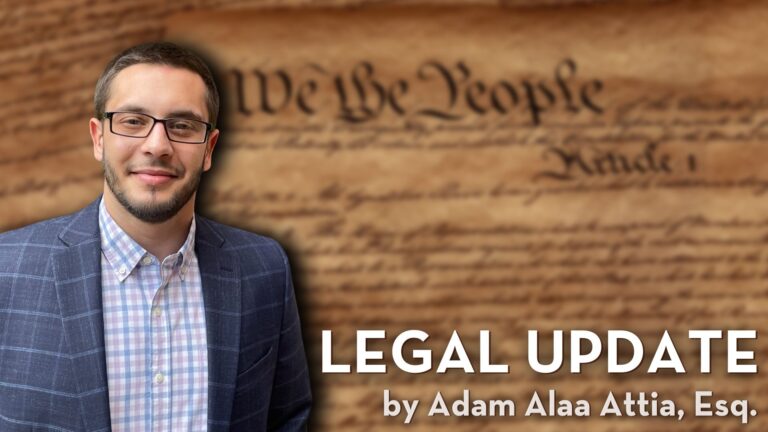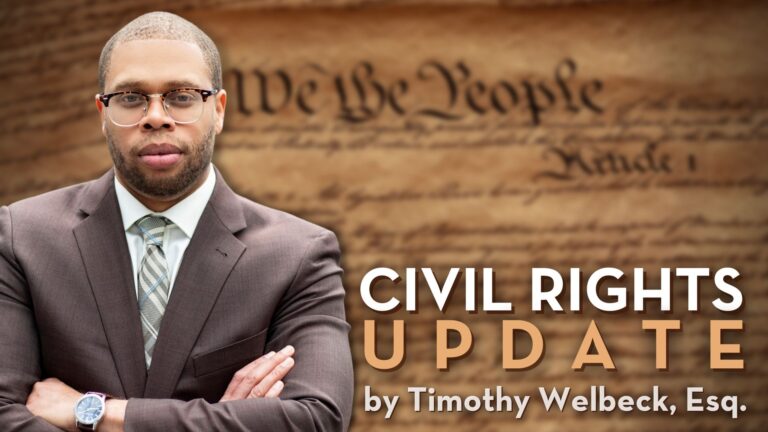![]()
by Amara S. Chaudhry, Esq.
The Legal Intelligencer
Can a federal grand jury be lawfully used solely for purposes unrelated to any criminal investigation?
The Philadelphia chapter of the Council on American-Islamic Relations (CAIR-Philadelphia) wants to know the answer to that question. To get that answer, CAIR-Philadelphia (which I serve as legal director) has already engaged in significant litigation on this issue at the district court level, and we have filed an appeal with the U.S. Court of Appeals for the Third Circuit.
In particular, CAIR-Philadelphia wants to know whether federal grand juries, which typically operate solely within the context of criminal law, can be used to assist the FBI with general “intelligence gathering” national security investigations in which there is no suspected violation of federal criminal law.
To articulate the precise issue more clearly, it is necessary to clarify the distinction between the “criminal investigations,” which are clearly within a grand jury’s lawful authority, and the type of general “intelligence gathering” investigations that concern CAIR-Philadelphia.
In the aftermath of the horrific attacks on the United States that occurred September 11, 2001, it is no longer possible to credibly dispute the fact that federal law enforcement, in the form of the FBI, no longer operates solely in the realm of criminal law. Prior to 9/11, the FBI was a traditional police-style law enforcement agency that collects evidence needed to prosecute past, present and ongoing federal crimes, including terrorism crimes pursuant to Title 18, Chapter 113B, of the U.S. Code. Since 9/11, the FBI has shifted its focus to become an intelligence agency that engages in general intelligence-gathering investigations to detect and prevent future acts that may, or may not, violate federal criminal law. This shift in focus has been documented by the Congressional Research Service, a nonpartisan entity that operates within the Library of Congress. (See the report “FBI Intelligence Reform Since September 11, 2001: Issues and Options for Congress (2004)” by Alfred Cumming and Todd Masse.) This shift was also documented in Time magazine as recently as May 13. (See “Homeland Insecurity: How Far Should We Go?”)
Some analysts have favored this increased shift toward intelligence-gathering, such as in “A Ticking Time Bomb: Counterterrorism Lessons From the U.S. Government’s Failure to Prevent the Fort Hood Attack” (Joseph I. Lieberman and Susan M. Collins, 2011), whereas other analysts have been deeply critical, as in “Targeted and Entrapped: Manufacturing the ‘Homegrown Threat’ in the United States” (New York: NYU School of Law, 2011). Despite this difference in opinion, however, there is little dispute that the shift has occurred.
Considered alone, this shifted focus in FBI operations would not necessarily be assumed to have any ability to affect legal proceedings. Pursuant to any classic interpretation of the separation of powers doctrine, the FBI operates wholly within the executive branch, and legal proceedings take place in courts, which operate wholly within the judicial branch.
However, there is increasing evidence that suggests the FBI manipulates legal proceedings to compel people to submit to some level of “voluntary” cooperation with the government in intelligence-gathering that is unrelated to any specific criminal investigation. (See “Under the Radar: Muslims Deported, Detained, and Denied on Unsubstantiated Terrorism Allegations” (New York: NYU School of Law, 2011) (describing the FBI’s interference with immigration proceedings for the purpose of compelling “voluntary” cooperation with general intelligence-gathering investigations); see also “The FBI’s Use of Informants, Recruitment and Intimidation within Muslim Communities” (Los Angeles: CAIR-LA, 2009) (citing numerous cases and articles) (describing the FBI’s manipulation of immigration and criminal law for the purpose of compelling “voluntary” cooperation with general intelligence-gathering investigations).)
Within this context, it is not unreasonable for CAIR-Philadelphia to question whether the federal grand jury process is the latest legal mechanism through which the FBI manipulates legal proceedings to compel “voluntary” cooperation with general intelligence-gathering investigations.
If federal grand juries in Philadelphia are being used solely for non-criminal investigations, such a practice would constitute an unprecedented deviation from the traditional role of the grand jury. Though information obtained through a legitimate criminal investigation by a federal grand jury can be disclosed to national security officials pursuant to Rule 6(e)(3)(D) of the Federal Rules of Criminal Procedure, there is no legal precedent authorizing the use of federal grand jury proceedings solely for the purpose of disclosing such information. Indeed, one American Bar Association publication, “Assessing the USA Patriot Act’s Changes to Grand Jury Secrecy,” 17 Crim. Just. 42, at pp. 49-50 (2002), has warned that these new disclosure rules could lead to the “backdoor expansion of grand juries.” Specifically, the ABA publication expressed concerns that prosecutors would be “‘tempted to manipulate the grand jury’s powerful investigative tools … to start or continue a grand jury inquiry where no criminal prosecution seems likely,'” quoting from United States v. Sells Engineering, 463 U.S. 418, 432 (1983). Moreover, the very same publication opines that such a “backdoor expansion” was not intended by Congress: “If Congress were to face the issue directly, it is doubtful whether it would pass a proposal explicitly authorizing federal grand juries to investigate any and all matters relevant to ‘foreign intelligence or counterintelligence.'”
So, if federal grand juries are being used in this unprecedented manner, is there any check on the grand jury’s power?
Yes — especially in the Third Circuit. Federal courts nationwide are controlled by Supreme Court precedent that gives federal courts limited authority to oversee grand jury investigations. (See Branzburg v. Hayes, 408 U.S. 665 (1972) (“the powers of the grand jury are not unlimited and are subject to the supervision of a judge”).) Furthermore, federal courts in the Third Circuit are governed by the decisions in In re Grand Jury Proceedings(Schofield I), 486 F.2d 85 (3rd Cir. 1973), and In re Grand Jury Proceedings (Schofield II), 507 F.2d 963 (3rd Cir. 1975). Pursuant to Schofield I, when a grand jury investigation is questioned by a subpoenaed party, the government is required to submit an affidavit (which has become known as a Schofield affidavit) making some preliminary showing regarding the “legitimacy of the purpose for issuing the subpoena.” Schofield II clarified that the district court has complete discretion to decide what additional procedures are needed after the submission of the Schofield affidavit. Schofield II specifically mentioned that the subpoenaed party that challenges the grand jury investigation has no automatic right to see the government’s Schofield affidavit, nor does he or she have a right to a hearing.
In the years that have followed Schofield, there have been numerous decisions that have analyzed the procedures taken by the court, after the submission of the Schofield affidavit(s), and questioned whether these additional procedures have been sufficient to satisfy the requirements of the Schofield decisions. However, there have been no published opinions that question whether Schofield affidavits are still required to be submitted as an initial matter — that requirement has never been questioned.
In CAIR-Philadelphia’s ongoing litigation, CAIR has questioned whether its clients received grand jury subpoenas pursuant to a criminal investigation, or whether the grand jury investigation at issue is related solely to a non-criminal intelligence-gathering investigation. CAIR-Philadelphia and its clients fully understand the duty to cooperate with any lawful criminal investigation and asked a federal court to compel the production of a Schofield affidavit so that the court could determine that the grand jury subpoenas were issued pursuant to a criminal investigation. The sole question on appeal is whether the lower court erred in refusing to compel a Schofield affidavit.
The question, as CAIR-Philadelphia sees it, is whether its clients are being served with federal grand jury subpoenas solely for the purpose of conducting non-criminal intelligence-gathering investigations. If such a practice is taking place, then that practice would constitute the type of “backdoor expansion of grand juries” the ABA warned against in the immediate aftermath of 9/11. Such an unprecedented expansion gives new relevance to the Schofield decisions in the Third Circuit and to the Supreme Court decisions in Branzburg and its progeny. By definition, federal grand juries operate under a cloak of secrecy. This secrecy is the very reason why the U.S. Supreme Court has given federal courts some supervisory authority — albeit limited — over federal grand jury investigations.
The original question posed by this article was: Can a federal grand jury be lawfully used solely for purposes unrelated to any criminal investigation? Perhaps the more relevant question is this: Are federal grand juries being used to conduct non-criminal general intelligence-gathering national security investigations? If courts refuse to require Schofield affidavits, we may never find out. •
Amara S. Chaudhry is legal director of the Council on American-Islamic Relations’ Philadelphia office (CAIR-Philadelphia). She also serves as 2013 chair of the Philadelphia Bar Association’s Public Interest Section and serves on the board of directors of the American Civil Liberties Union of Pennsylvania, Philadelphia chapter.




